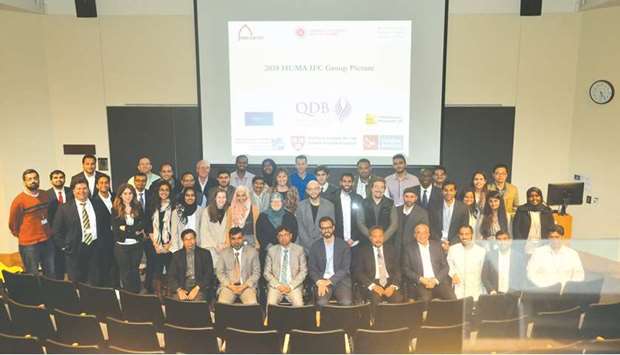The College of Islamic Studies (CIS), part of Hamad Bin Khalifa University (HBKU), recently participated in the 2018 Harvard Islamic Finance Conference as an Academic Sponsor.
The conference aimed to engage students, academics, and professionals in topics relating to ethical commerce and the social aspect of finance.
Held on October 26-27 at Harvard University in the US, the conference was hosted by Harvard University Muslim Alumni (HUMA) and attracted experts from all around the world.
The opening remarks were co-delivered by the director of the Research Division at CIS, Dr Syed Nazim Ali, who is also an academic advisor to HUMA and a distinguished thought leader in the field of Islamic finance and its development in the modern world.
Dr Nazim said: “The conference has been an impressive venue for globally leading scholars, experts, and practitioners in the areas of Islamic finance, impact investment, and social entrepreneurship as well as TED talk-style presentations highlighting businesses and social entrepreneurs that embody Islamic ethics and seek to leverage Muslims’ talent and resources.”
He added that the conference was an ideal opportunity for CIS to establish partnerships with globally renowned universities such as Harvard University, MIT, and UMASS Boston.
Dr M Evren Tok, associate professor and associate dean of innovation and community engagement at CIS, participated in a panel discussion entitled ‘The Building Blocks of a Muslim Entrepreneurial Ecosystem’.
Together with other members on the panel, Dr Tok discussed the many challenges and opportunities for Muslim entrepreneurs.
The panel covered various issue areas in relation to values and entrepreneurship, attitudes, the state of Muslim world in establishing start-ups and potential advantages of Muslim entrepreneurs in global markets.
Throughout the conference, delegates attended a number of plenary and parallel sessions on numerous topics, including ‘The Role of Multilateral Institutions in Promoting Islamic Finance’; ‘Islamic Finance 101’; ‘Impact Investing and Domestic Institutions: A Path Towards Sustainability’; ‘Stories of Excellence: How They Built Social Enterprises’; and ‘Fintech, Blockchain and Crowdfunding: Its Role in Impact Financing’.
The College of Islamic Studies offers Master’s and PhD programmes in Islamic Finance, which are two of the most innovative Islamic finance programmes taught in the Islamic world.
They combine the fast-growing field of Islamic finance with global developments, cutting-edge technologies, and current concepts such as Fintech and Blockchain, to equip their students with the most up-to-date skills and expertise.

Delegates at the 2018 Harvard Islamic Finance Conference pose for a commemorative photo.
